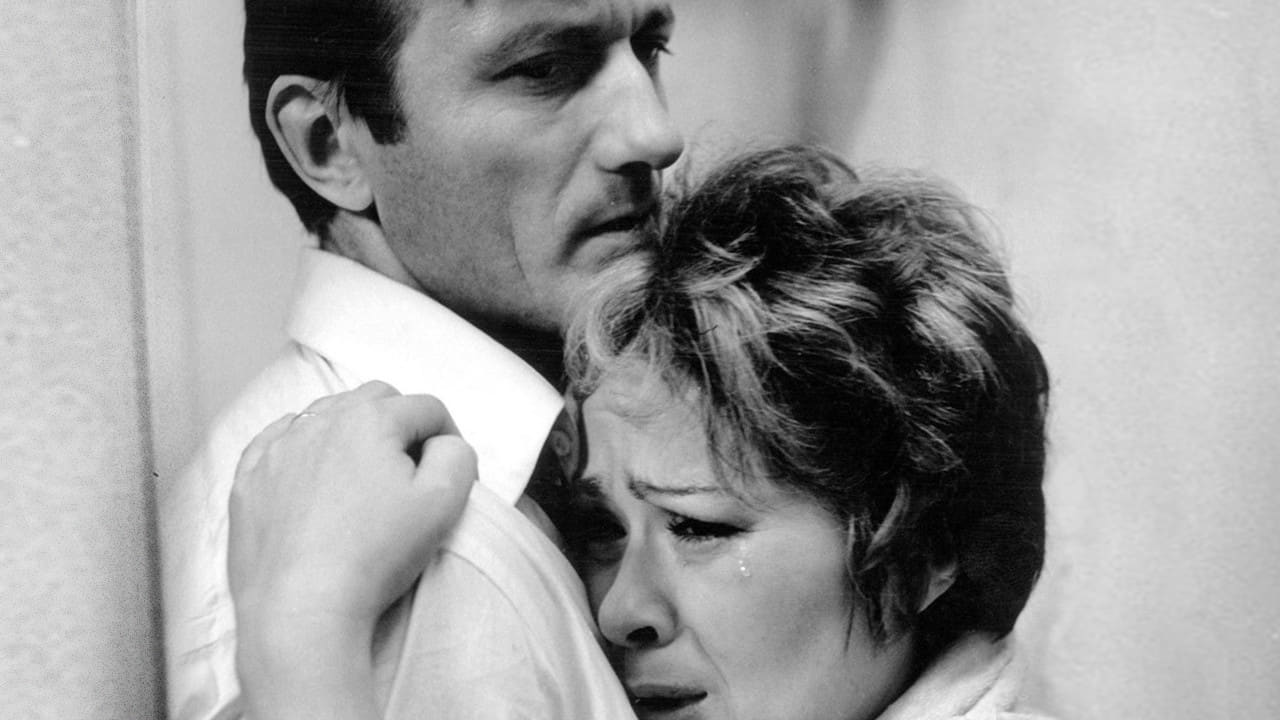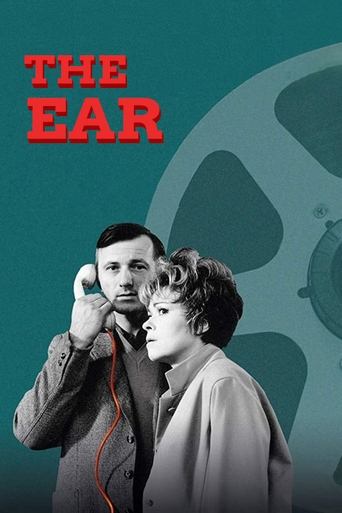

It is very confusing! This movie was finished in 1970. To put 1990 it is so confusing. I thought it was another movie when looking for it just because of that date.
... View MoreHusband and wife stagger tired and tipsy through their house at night holding candelabras. Something's not quite right, a basement door open ajar, keys where they shouldn't be, electricity and phone are out of order. A little earlier the movie opens with the couple back at their house after a 'party' gala. They fight and bicker on the pavement out of the car, then inside the house, like we're behind a closed door hearing echoes of Who's Afraid of Virginia Woolf. Flashbacks to the party earlier that night in subjective POV shots take us through a roomful of people dressed in suits holding up cocktail glasses ready to toast prominent Party figures, faces peering intently into the camera, huddling together to hide conspiratorial whispers or perhaps simple idle gossip. When the husband goes to the bathroom to freshen up, an old woman shows up to offer him a towel; in doing so, she disappears in the background and stays there, as though placed there to observe.This is a great movie about paranoia, the "fear" of being watched and discussed, and it's a half good movie when it stops being about paranoia, because at some point we know the couple is being monitored by the Party and have had to live with bugs in their living room for years. In the famous finale of The Conversation, a maddened Gene Hackman tears through his apartment looking for bugs. His nightmare echoes through the years of cinema because it's a nightmare left incomplete, damnation through eternity. Here things become clear in the final act.This is ambiguous psychodrama for as long as it suits the movie, then it becomes the political indictment it planned to be. It's stunning to me that a movie like this was allowed to be made in the Eastern Bloc of the 1970's. Usually filmmakers working in Soviet Union satellite republics spoke of Soviet tyranny indirectly. They used the Nazis to tell us about living through the oppression of a totalitarian regime. Here comrade Stalin is mentioned by name. As such, this is a brave movie that attacks contemporary things of a contemporary society.The dimensions of this political thriller are most chilling for me in a particular scene: the husband asks the wife to remember earlier at the party if one particular guest was friendly to her and addressed her by her first name. He reasons that if he did so, if he recognized her in public in a friendly manner, that the husband is not under political scrutiny by his higher-ups, if that were the case everyone would keep their distance from even the wife. Social life in The Ear is not leisure time or exchange of ideas, it's an arena of suspicion and conspiracy, a chess game of ritualized behavior and expected moves.Back home, behind closed doors, The Ear never sleeps. Under its scrutiny, married life becomes the forum of vented anger and frustration. As the married couple stagger through their household in the dark holding candelabras as though exploring the catacomb of a Gothic horror movie, their exchanges become increasingly unpleasant and hostile. There's one very grueling scene in the bathroom where the wife berates her husband for the choices of a lifetime. Yet in the important moments of life and death, when a man is about to take his own life or when they're coming to get him, they're close together in defiance of everything.
... View MoreI've seen this a couple of days ago in a tribute to Karel Kachyna who died recently. It is simply amazing. A well connected party/government (same thing) aparatchik and wife get driven back to their villa from a state reception to find their keys missing, house unlocked, without electricity, working telephone. They are being snippy with each other to start with, but when the man starts getting a little paranoid about the situation and starts getting little flashbacks from the reception (his immediate boss - a minister - and several colleagues are not present there, some ppl express mild suprise he is there himself, he is obviously not privy to certain hush-hush information, their chaffeur is missing and the place is full of "cliftons" i.e. secret police (get me a salmon, that's the red thing:)) they both really deteriorate into panic, accusssations, dragging long-forgotten things into open... The point is they know they are being listened to, but their safe haven are the toilets, the bathroom and the kitchen where the bugging devices are not ordinarily placed... but not for long I cannot imagine how did Mr. K imagine this thing would be released ever. It's a miracle it only got shelved and can remind us nowadays how bad it really was...It is one of the most thruthfull portrayals of uncertanities of love and life back then
... View MoreIn 1970, director Karel Kachyòa, created a unique film which shows us a study of fear among the communist prominence in 50's. One of high ranked officials is paranoid as his immediate superior is said to be in a bad position and is going to be removed, or in Orwell's terms: vaporized. So the main hero is very nervous, and he's sure his house is full of wiretaps. The main part of the film describes the tension between the husbands, turning from love to hate and back... In the morning he's waiting for the secret police to arrest him, but instead he receives a phone he becomes the new boss of the whole department.The story is very impressive - and due to the situation in early 70's (the country was occupied by Soviets in 1968) it wasn't shown to public until the communist regime broke down. Everyone who had something to do with this film had big troubles later and had to 'prove' his/her loyalty to the regime.All in all, a film that is definitely worth seeing, probably the best psychological thriller in czech cinematography and a must for everyone interested in the inner functions of every totalitarian society.
... View More